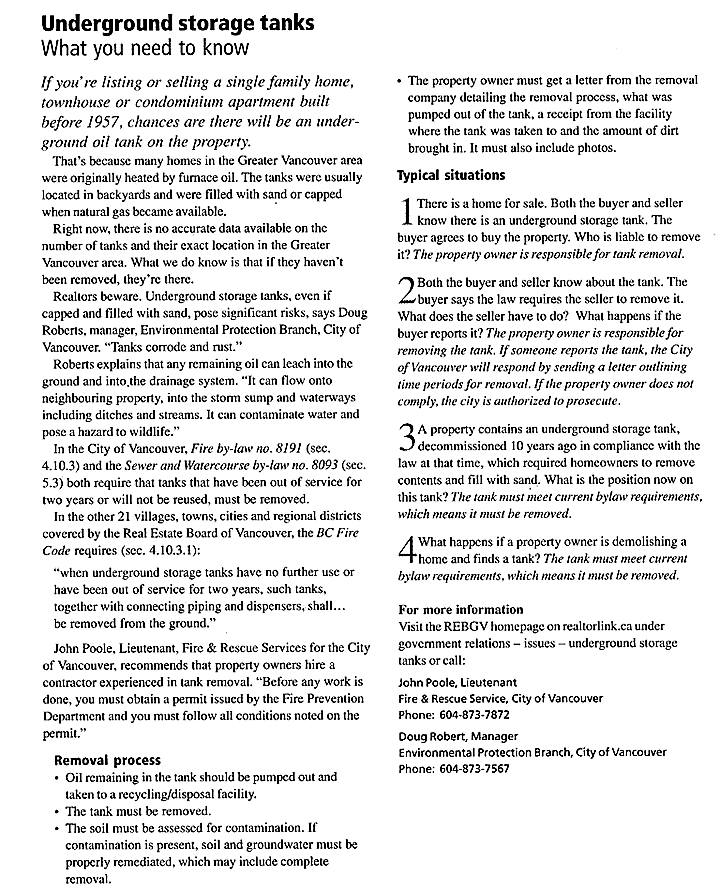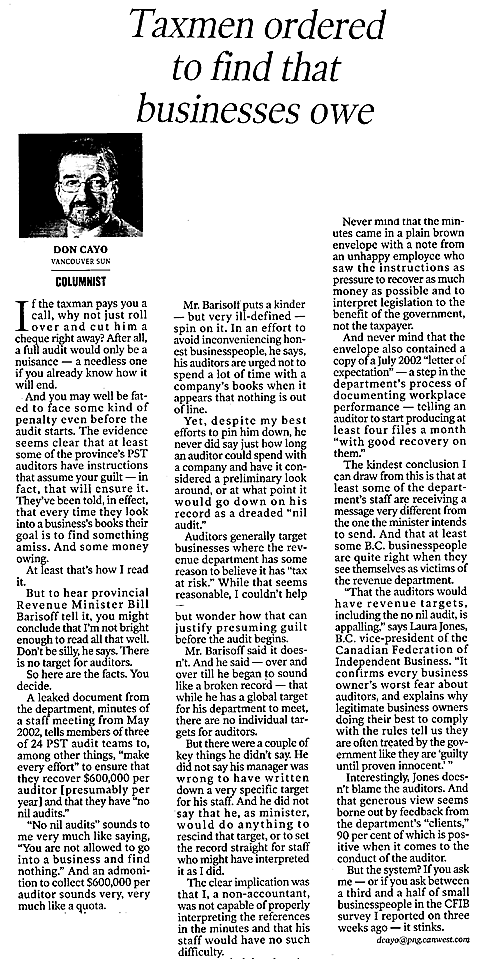Just when you thought house prices couldn’t go any higher, historically low rates combined with pent-up demand are fuelling the already scorching hot Lower Mainland real-estate market
Jack Keating and Ashley Ford
Province

WHAT YOUR $300,000 WILL BUY ACROSS CANADA: Halifax: Price: $299,900. This new three-bedroom, 2 1/2 bathroom home sits on a 50 ft. x 115 ft. lot and features bay windows, top-of-the-line kitchen, heated floor, den with door to back patio and landscaped yard.

WHAT YOUR $300,000 WILL BUY ACROSS CANADA: Montreal: Price: $299,000. This new three-bedroom home has 2 1/2 bathrooms and sits on an irregular 14,000 sq. ft. lot. It features a fireplace, central air conditioning, double garage and finished basement.

WHAT YOUR $300,000 WILL BUY ACROSS CANADA: Toronto: Price: $299,900. This three-bedroom, two bathroom home sits on a 35 ft. x 121 ft. lot. It has new wiring, updated kitchen, parquet flooring throughout and impressive landscaping front and back.

WHAT YOUR $300,000 WILL BUY ACROSS CANADA: Winnipeg: Price: $299,900. This 2,400-square-foot, three-bedroom home on the river has a pool, heated garage, suite over garage, commercial kitchen and hot-tub room. Lot size is 100 ft. x 340 ft. The ‘river retreat’ is 69 years old.

WHAT YOUR $300,000 WILL BUY ACROSS CANADA: Edmonton: Price: $299,900. New 2,271-square-foot home has four bedrooms, 21/2 bathrooms, including luxury ensuite with jacuzzi and oversize shower. Irregular lot covers 7,250 square feet.

WHAT YOUR $300,000 WILL BUY ACROSS CANADA: Surrey: Price: $299,900. This 1,800-square-foot, two-bedroom updated house with a one-bedroom suite in the basement sits on 67 ft. x 186 ft. lot that has possible subdivision potential.
Rachel Beedle and Tony Spiess are among the throngs who have pushed Greater Vancouver home sales to record highs.
They bought their first home in Coquitlam three weeks ago for $343,000.
“The prices are quite high,” said Beedle. “I thought it was a good time for me. I owned an apartment before [we bought], so for me to sell my apartment at this time was a good idea.”
Royal LePage Real Estate Services said yesterday that the price of a detached bungalow in Greater Vancouver in the third quarter was $387,171, compared with $351,137 in the third quarter of last year, a 10.3 per cent increase. A standard two-storey was $448,187, compared with $399,809 last year, an increase of 12.1 per cent.
In Victoria, the price of a detached bungalow was $269,000, up 10.2 per cent from $244,000 in the third quarter last year. A standard two-storey was $287,000, up 5.5 per cent from $272,000.
Nationally, the average price of a detached bungalow rose 6.9 per cent to $235,055, a standard two-storey home 6.4 per cent to $262,016, and a standard condominium 7.0 per cent to $149,772.
Greater Vancouver sales last month rose 35.6 per cent to 3,357 units compared with 2,476 units in September last year.
Bill Binnie, president of the Real Estate Board of Greater Vancouver, said demand last month was the highest since 1992 and he expects it to continue.
“There is likely still some pent-up demand from consumers who have been holding off buying and selling,” he says.
Greater Vancouver prices show no signs of moderating. The price of a single-family home has risen 12.9 per cent from a year ago to $436,950, while a townhouse has risen by 13.4 per cent to $280,050.
The lower end of the market and sector of greatest demand, apartments, has had the highest increases. Prices have climbed by 15.3 per cent from a year ago to $209,280.
Fraser Valley sales jumped by 41 per cent in September to 1,679 compared with 1,193 in September 2002.
“The train keeps coming down the track and there seems no stopping it,” said Reg Davies, of the Fraser Valley Real Estate Board.
But there is some evidence of price fatigue in the valley. Last month the price of a single-family home was $303,365, down from August’s $309,267. Townhouses remained the same at $193,382 while apartments climbed to $123,008 from $121,958 in August.
Phil Soper of Royal LePage said “historically low interest rates have made this one of the most affordable times for Canadians to purchase a property. But buyers paid the highest average prices on record for their homes during the third quarter.”
He said the pace of price increases in Edmonton, Ottawa, Halifax and Toronto is slowing, while Calgary has become a buyer’s market.
There are other signs Canada‘s housing market — the Lower Mainland apart — may be cooling.
StatsCan reported yesterday that building permits across Canada dropped 13.4 per cent in August to $4.1 billion, down from a record high of $4.7 billion in July.
Housing permits fell 8.3 per cent to $2.6 billion after three monthly gains while non-residential permits plunged 21.1 per cent from a 14-year high to just under $1.5 billion, with declines in industrial, commercial and institutional.
Beedle and Spiess, meanwhile, said they decided to buy before it gets even more expensive.
“In the past year I’ve seen prices go up in Coquitlam and that was another reason I wanted to buy now, before they got any higher,” said Beedle, 29, a teacher.
Home buyers may not be able to take further increases.
“We’re starting to get some resistance on this for the first time in 18 months,” said Remax agent Wayne Dick. “We’re starting to hear some of the buyers say, ‘where are we going with this?”‘
SEPTEMBER HOUSE PRICES
Detached homes Attached homes Apartments
Sept. 2003 Sept. 2002 % change Sept. 2003 Sept. 2002 % change Sept. 2003 Sept. 2002 % change
Abbotsford $243,000 $216,900 12.0% $164,000 $135,900 20.7% $87,900 $79,000 11.30%
Burnaby $413,000 $372,000 11.02% $242,000 $216,000 12.04% $164,750 $142,000 16.02%
Coquitlam $364,000 $325,000 12.00% $222,500 $215,000 3.49% $140,000 $136,000 2.94%
Delta North $275,000 $240,000 14.6% $161,000 $114,000 41.20% $131,000 n/a n/a
Delta South $336,000 $296,000 13.51% n/a n/a n/a $190,000 n/a n/a
Langley $300,000 $262,000 14.50% $205,900 $174,000 18.30% $123,000 $116,500 5.60%
Maple Ridge – Pitt Meadows $279,900 $258,000 8.49% $167,000 $151,500 10.23% $106,500 n/a n/a
Mission $214,000 $175,000 22.30% $145,000 $148,500 -2.40% $95,000 $85,900 10.60%
New Westminster $345,000 $261,500 31.93% n/a n/a n/a $152,500 $135,000 12.96%
North Vancouver $530,000 $420,000 26.19% $300,000 $290,000 3.45% $203,500 $172,000 18.31%
Port Coquitlam $316,500 $268,000 18.10% $206,500 n/a n/a $116,750 $100,000 16.75%
Port Moody/Belcarra $385,000 $367,500 4.76% $197,750 $174,000 13.65% $150,000 n/a n/a
Richmond $380,800 $341,000 11.67% $256,000 $235,000 8.94% $161,000 $155,000 3.87%
Squamish $315,000 n/a n/a n/a n/a n/a n/a n/a n/a
Sunshine Coast $220,000 $187,500 17.33% n/a n/a n/a n/a n/a n/a
Surrey $303,500 $280,000 8.40% $198,000 $189,000 4.8% $122,000 $94,000 29.80%
Vancouver East $365,000 $295,000 23.73% $245,000 $258,000 -5.04% $150,000 $132,000 13.64%
Vancouver West $740,000 $598,000 23.75% $397,000 $320,000 24.06% $253,000 $235,000 7.66%
West Vancouver – Howe Sound $845,200 $717,500 17.80% n/a n/a n/a $365,000 n/a n/a
White Rock $400,000 $393,000 1.80% $270,000 $240,000 12.50% $167,168 $125,000 33.70%
Sources: Real Estate Board of Greater Vancouver, Fraser Valley Real Estate Board
© Copyright 2003 The Province













